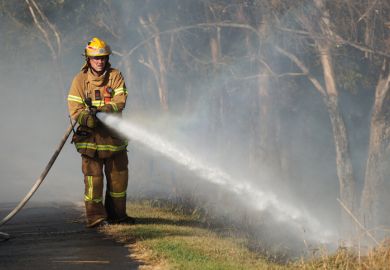We have reached a significant milestone: more than half of all UK universities have made the commitment to divest from fossil fuels companies in some form. I strongly believe it is imperative that all UK universities urgently join us – not only in divestment but also by taking action on where we choose to borrow from.
The climate crisis demands our urgent attention, and we have a moral responsibility to act.
2018 was the fourth warmest year on record, after 2016, 2015 and 2017 respectively. It saw the highest levels of heat-trapping gases and sea levels recorded since records began. 2019 continued that trend.
These climatic changes are already wreaking havoc on communities across the globe, with September 2019 bringing two catastrophic events.
Hurricane Dorian wrought “generational devastation” in the Bahamas when it intensified from a Category 2 to 5 in just two days. It was one of the strongest storms ever recorded. In the Bahamas alone over 76,000 people were displaced and 70 people died – nearly 300 are still missing.
And as I write this, Australia continues to burn in the devastating bushfire crisis that began back in September and has since swept across vast swathes of the country. By 3 January, six million hectares had burned – equivalent to one quarter of the UK. So far, the bushfires have led to the deaths of 24 people, thousands of homes lost, wildlife killed on an unprecedented scale and the displacement of First Nations communities from their lands.
The climate crisis exacerbates already stark global inequalities where its impacts are disproportionately felt by those least responsible and able to prevent, mitigate and rebuild after a climate-related disaster.
Climate justice is high on the agenda of our current – and future – students, as displayed by the inspiring youth strike movement. As the youth strikers point out, it is our future students who will be forced to grapple with the extreme impacts of the climate crisis. Understandably, they expect action from us.
And that action needs to be meaningful and effective.
That is why divestment from the fossil fuel industry is so important. It is a leading contributor to climate change; just 100 companies have been responsible for 71 per cent of global carbon emissions since 1988. Shell and BP – the top two extractor fossil fuel companies in terms of higher education investments – are two of the highest emitters.
And yet, despite being aware of climate change and its role within it, the fossil fuel industry has not taken action to rapidly adapt its business models, but instead is lobbying to “control, delay or block” policies designed to tackle it.
BP, Shell, ExxonMobil, Total and Chevron – the top five publicly traded oil and gas companies – have spent more than US$1 billion (£770 million) since the 2015 Paris Agreement on “greenwashing” their branding. They have simultaneously marketed climate “action” while massively expanding their oil and gas operations. In 2018 all major fossil fuel companies approved fossil fuel infrastructure that is not Paris-compliant.
Given all this, divesting from fossil fuels is the obvious choice for universities. It is also why our key borrowing partner, Triodos, is a world leader in sustainable banking.
Universities exist for the public good. We have a major role to play in transforming society as shapers of thought and progress. This means we can – and should – play a leading role in supporting global society to decarbonise. This means conducting research into how to make the transition to a low-carbon world equitable and just. It also means exploring and creating viable reinvestment and borrowing options into sectors such as healthcare and housing, as well as community-owned on-campus renewables and sustainable banks.
A better world, co-created and envisioned with our students and local communities is possible. Divestment from fossil fuels and new borrowing choices are a fundamental part of that. The steps to address the crisis are there, we just need the willpower.
Joy Carter is vice-chancellor at the University of Winchester.
Register to continue
Why register?
- Registration is free and only takes a moment
- Once registered, you can read 3 articles a month
- Sign up for our newsletter
Subscribe
Or subscribe for unlimited access to:
- Unlimited access to news, views, insights & reviews
- Digital editions
- Digital access to THE’s university and college rankings analysis
Already registered or a current subscriber?




